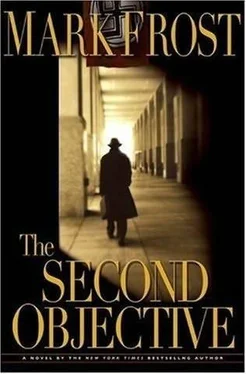“How was your trip?” asked Bernie.
“Appalling,” he said with a smile, making no effort to keep the conversation going.
“Where’d you come in from, Lieutenant?”
“Where are you from, if you don’t mind my asking? Your English is astonishing.”
“I’m from New York. Brooklyn.”
“Is that a fact? How fascinating. Born and bred?”
“That’s right. How about you?”
“Munich, but as you may have gathered, I spent my formative years in England. Father was in the diplomatic corps, stationed to the embassy in London. We went over in twenty-eight. I was ten at the time. Father enrolled me at Westminster, public school. All those incestuous aristocratic family trees, it’s a breeding ground for degenerate half-wits. So in I waltzed from the hinterlands, armed only with my meager schoolboy English. Bit of a wonder I survived.”
“Hope the education was worth it.”
“Oh, I got an education, all right. Where were you at ten, Brooklyn?”
“Fifth grade. PS 109.”
“Of course you were. How charming.”
“So you spoke only English in school?”
“Not just in school, old boy. At home, in the park, in the bath with my proper English nanny. Even family dinners. Father didn’t want any guttural German consonants ruffling the feathers of our hosts.”
“When did you come back to Germany?”
“Once the unpleasantness broke out, the tea bags ushered us straight to the door. Imagine my father’s disappointment. He’d spent the better part of his life trying to penetrate this ironclad veil of courtesy. He never realized that’s the reason for their obsession with manners: a coat of paint covering a hatred of all things foreign. And they seem so polite until you get to know them.” Von Leinsdorf flashed a smile, stood up, and walked to the window. “So we both came back to Germany at the same age. Strange, feeling the outsider in your own country, isn’t it?”
You don’t know the half of it, thought Bernie.
“Where the devil are we, by the way? I was hoping I might be headed to Berlin. Has anyone told you what this is about?”
“Not a word,” said Bernie.
“Very hush-hush all this, isn’t it? Have they tipped their hand about what we’re doing here, Brooklyn?”
“All they told us is that this guy Colonel Skorzeny’s running the show.”
Von Leinsdorf spun around. “Skorzeny? Otto Skorzeny?”
“That’s what they said.”
“Have you seen him? Has he been here?”
“No. Why?”
“I tried to transfer into his commando unit last year-”
“Where you been stationed?”
“Dachau,” he said casually, flicking his cigarette.
Bernie had heard about the Munich suburb the SS used as a training center. Lurid stories about their concentration camp had been circulating through Berlin, but he knew better than to ask. He’d learned never to ask an SS man anything.
“I’m going to write up this report that your English is first rate,” said Bernie. “They’ll probably put you in Category Two.”
Von Leinsdorf leaned over to glance at Bernie’s notes. “That sounds suspiciously like a demotion. Why not Category One?”
“That’s only for guys who come in knowing a lot of American slang.”
“But you could teach me, couldn’t you?”
“If that’s what they want-”
“It’s what I want,” said Von Leinsdorf, sharply. He softened his tone and turned the charm back on. “Just between us, old boy, I hate thinking I’m not good enough for the top category. Sheer vanity, really.”
“It’s not up to me.”
“I’m not asking for much. Wouldn’t want the officers to think you’re reluctant to help a fellow soldier. All this cloak and dagger, they must be watching you more closely than the rest of us. I’m sure they’d take a dim view of wobbly loyalties.”
Bernie smiled, trying not to let him see that he’d even heard the threat. “I’ll try to help you out, sure, what the fuck.”
“What the fuck?”
“Most popular word in the GI language. Fuck this, fucking that. Fucking camp-”
“Fucking Krauts-”
“Now you’re cooking with gas.”
“What the fuck does that mean?”
“Means you’re on the money, on the beam, moving down the right track.”
“Right. So, Category One, then. I’ll make it up to you, Brooklyn, see that you’re assigned to my squad. We should fucking stick together, don’t you think?”
“Sure, what the fuck.”
Both men laughed. Bernie couldn’t help liking the man, in spite of his initial reservations.
“What took you so long getting here?” asked Bernie. “They brought the rest of us in two weeks ago, you don’t mind my asking.”
“Haven’t a clue. I assume it was some bureaucratic foul-up.”
“A snafu.”
“Pardon?”
“It’s a whatchamacallit, a word you make from initials, an acronym? Situation Normal: All Fucked Up.”
“Yes, brilliant. Snafu, indeed. The thing is, Brooklyn, I only heard about this two days ago. We were near the end of a major project, so they couldn’t bear to part with me.”
“At Dachau.”
“That’s right,” said Von Leinsdorf, smiling as he lit another cigarette.
“So did you finish it? Your project?”
“A ways to go yet. Afraid they’ll have to carry on without me.”
Von Leinsdorf motioned with his head for Bernie to follow, and they walked into the darkening evening, back toward the dining hall. Von Leinsdorf tossed away his half-smoked cigarette and asked Bernie for one of his Lucky Strikes.
“Do you mind?” he asked. “I should get used to these.”
“Help yourself.”
Von Leinsdorf pulled the cigarette from the pack with his lips and torched it. “What do we call these? Smokes?”
“Smokes, nails,” said Bernie.
“Nails?”
“Coffin nails. Sticks, butts.”
Von Leinsdorf nodded, then lit and studied his cigarette. “So what are they training us for, Brooklyn? I get a different answer from everyone.”
“They say we’re going to defend Cologne when the Allies invade-”
“Come on, that’s pure codswallop. All this trouble just to have us dig and wait for Patton to cross the Rhine? This is a Skorzeny mission. Hitler’s commando. Start with the name: Operation Greif -the griffin. You remember what it looks like? Half German eagle, half Allied lion. Our purpose is in that image. We’re going to cross the line disguised as an American brigade, a surprise attack. Something to shock the world.”
“Maybe you’re right,” said Bernie, trying to sound casual as he heard his worst fear realized.
“I’m sure of it. And I’ve got a good idea what our target might be.”
Bernie’s eye caught a metallic flash of light above them in the darkness, from a guard tower directly above the courtyard.
“Somebody’s up there,” he said.
Von Leinsdorf turned to look. A tall, sturdy officer in uniform leaned forward, lighting a cigar, his face visible in the flame of the lighter a soldier held for him.
“It’s him,” said Von Leinsdorf.
“Who?”
“Skorzeny’s here.”
Grafenwöhr
NOVEMBER 20, 1944
The entire 150th Panzer Brigade was called into the commons at six-thirty A.M., before the morning meal. Bernie, Von Leinsdorf, and the rest of Captain Stielau’s commando group stood in the first two rows facing the dining hall as a light mist fell from an overcast sky. Five minutes later the brigade snapped to attention as the camp’s brass marched out ahead of Colonel Skorzeny. He wore his dress uniform but no overcoat, unlike the rest of the officers, and a confident smile that seemed oblivious to bad weather and any other adversity. Skorzeny stopped and surveyed his men for nearly a minute, studying faces, before he uttered a word. The Iron Cross hung at his throat, between the lightning SS runes and insignia of rank on his high, stiff collar. His bright eyes and sharp features suggested to Bernie the image of a hyper-intelligent fox.
Читать дальше












